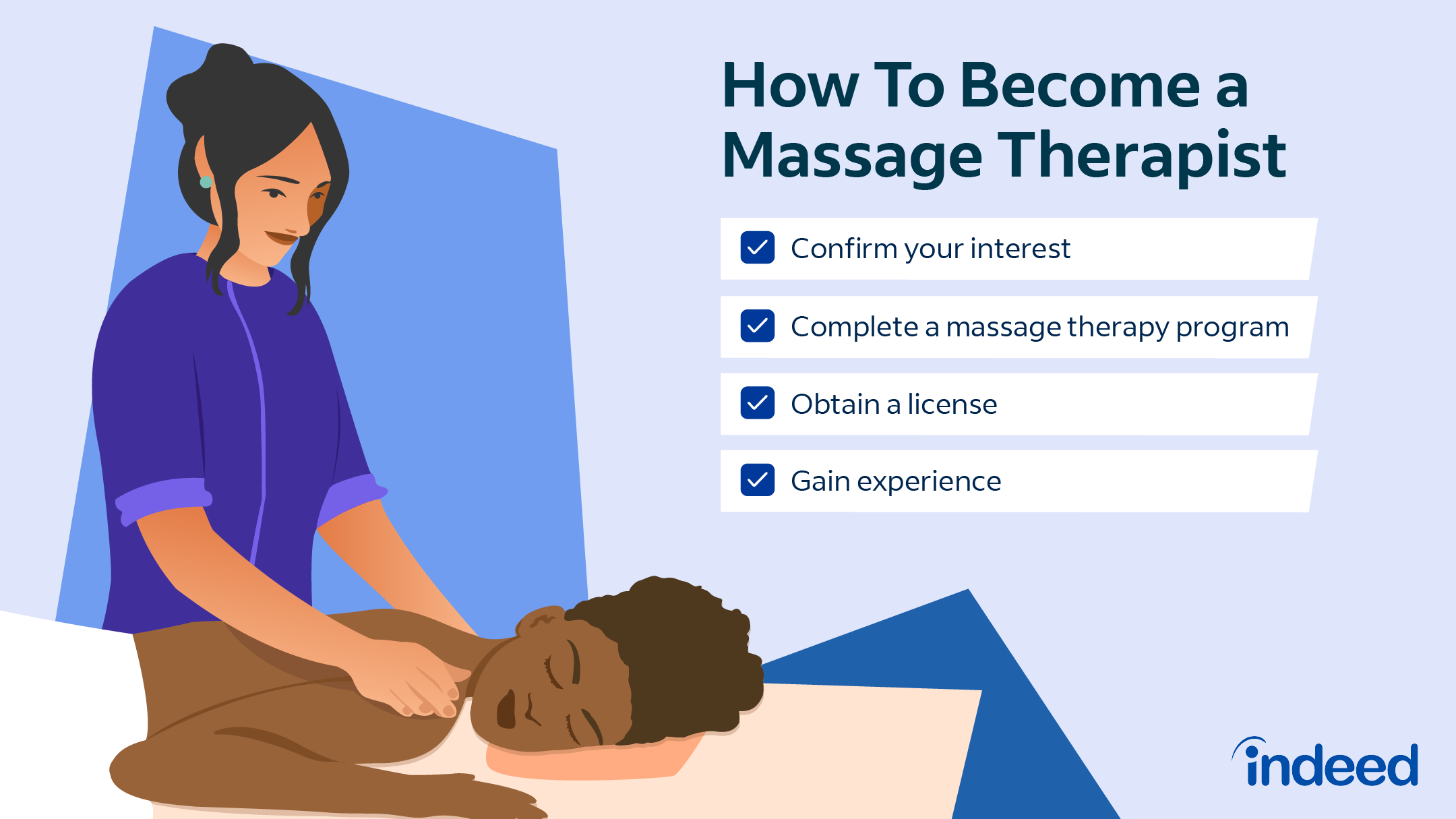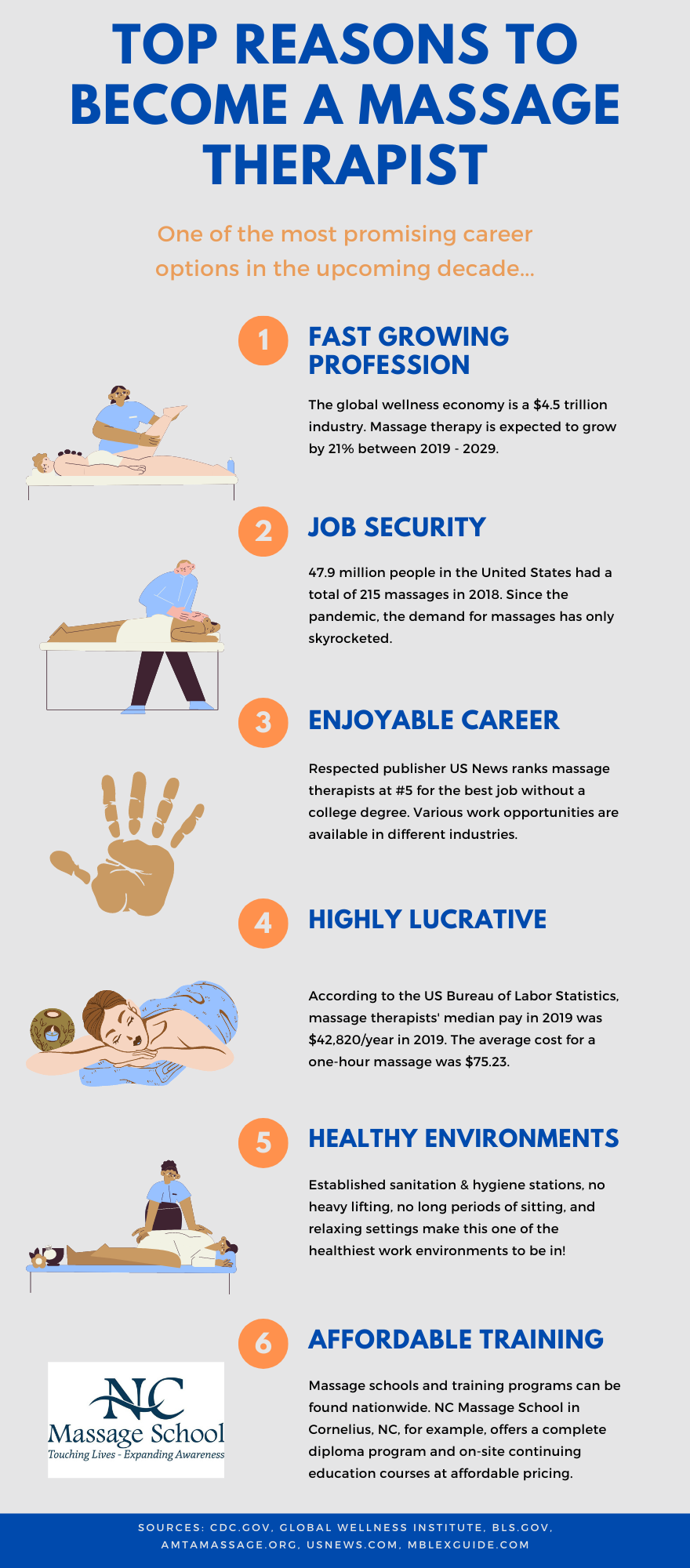How to Become a Massage Therapist: Ultimate Guide

To become a massage therapist, complete a training program and obtain a license. These requirements vary by state.
Becoming a massage therapist can be a rewarding career path for those interested in helping others improve their physical and emotional well-being. To become a licensed massage therapist, one must complete a training program that includes both classroom education and hands-on experience.
The specific requirements for training and licensing vary by state, but most programs require several hundred hours of training. In addition to completing the necessary training, prospective massage therapists must also pass a licensing exam. Once licensed, massage therapists can work in a variety of settings, from spas and wellness centers to hospitals and rehabilitation clinics. Those who are passionate about helping others and have strong interpersonal skills may find that a career as a massage therapist is a good fit for them.
The Lure Of Massage Therapy
Embarking on the journey to become a massage therapist opens doors to a rewarding career in holistic wellness. Embracing the art of healing touch, aspiring therapists undergo rigorous training to master various massage techniques and anatomy knowledge, paving the way for a fulfilling profession dedicated to enhancing clients’ well-being.
Growing Demand For Skilled Therapists
The world is becoming more stressful every day, and people need ways to manage their stress levels. Massage therapy has proven to be an effective stress reliever, and as a result, the demand for massage therapists is on the rise. According to the Bureau of Labor Statistics, the employment of massage therapists is projected to grow 21 percent from 2019 to 2029, which is much faster than the average for all occupations.
Benefits Of A Career In Massage Therapy
Massage therapy is a great career choice for those who are passionate about helping others. Not only does it provide a flexible work schedule, but it also offers a sense of fulfillment as you see the positive impact of your work on your clients. Additionally, massage therapists can work in a variety of settings, including spas, hotels, hospitals, and even sports teams. It’s a career that allows for creativity, personal growth, and continuous learning. If you’re considering a career in massage therapy, there are many benefits to look forward to. You’ll have the opportunity to make a difference in people’s lives, work in a variety of settings, and enjoy a flexible schedule. Plus, with the growing demand for skilled therapists, you’ll have plenty of job opportunities to choose from.
First Steps On The Path
Embarking on a career as a massage therapist can be a rewarding and fulfilling journey. If you have a passion for helping others and a desire to promote wellness, becoming a massage therapist might be the right path for you. Before you dive in, it’s essential to take the first steps to ensure that this profession aligns with your interests and goals.
Self-assessment: Is This The Right Path For You?
Before pursuing a career as a massage therapist, it’s important to conduct a self-assessment to determine if this profession is a good fit for you. Consider the following:
- Are you passionate about promoting health and well-being?
- Do you enjoy working with your hands?
- Are you comfortable with physical contact?
- Do you have good communication and listening skills?
- Can you handle the physical demands of the job, such as standing for long periods and performing repetitive motions?
Answering these questions honestly will help you gauge if becoming a massage therapist is the right career path for you.
Researching The Profession
Once you’ve determined that becoming a massage therapist aligns with your interests and skills, it’s time to dive deeper into researching the profession. This will give you a better understanding of the requirements, opportunities, and challenges that lie ahead. Consider the following:
- Research massage therapy programs: Look for reputable schools or institutions that offer accredited programs. Check their curriculum, duration, tuition fees, and any additional certifications they offer.
- Explore different types of massage therapy: Familiarize yourself with the various modalities and techniques of massage therapy, such as Swedish massage, deep tissue massage, sports massage, and aromatherapy.
- Speak with practicing massage therapists: Reach out to professionals in the field to gain insights into their experiences and get a firsthand understanding of the day-to-day responsibilities and challenges of being a massage therapist.
- Consider the job market: Research the demand for massage therapists in your area. Look into potential employment opportunities in spas, wellness centers, rehabilitation clinics, or consider the option of starting your own practice.
By thoroughly researching the profession, you’ll be better equipped to make informed decisions and set realistic expectations for your journey towards becoming a massage therapist.
Educational Requirements
To become a massage therapist, aspiring individuals typically need to complete a post-secondary education program, which may vary in length from 6 months to 2 years, depending on the state’s requirements. These programs cover anatomy, physiology, and various massage techniques, and may culminate in a diploma or certificate.
Additionally, some states may require passing an exam and obtaining a license.
Choosing The Right Massage Therapy School
When pursuing a career as a massage therapist, choosing the right massage therapy school is crucial. The school you select will not only provide you with the necessary education and training but can also have a significant impact on your future career prospects.
Here are a few factors to consider when choosing a massage therapy school:
- Accreditation: Ensure that the school is accredited by a recognized accrediting body. Accreditation ensures that the school meets specific standards of quality and that your education will be recognized by employers and licensing boards.
- Curriculum: Look for a school that offers a comprehensive curriculum that covers a wide range of massage techniques and modalities. A diverse curriculum will provide you with a solid foundation and the skills needed to work with various clients.
- Faculty: Research the qualifications and experience of the school’s faculty members. Experienced and knowledgeable instructors can greatly enhance your learning experience and provide valuable insights into the industry.
- Facilities and Resources: Visit the school’s campus if possible to assess the facilities and resources available. A well-equipped school with modern facilities will allow you to practice your skills in a supportive and professional environment.
- Job Placement Assistance: Inquire about the school’s job placement assistance program. A school that offers support in finding employment opportunities can be a valuable asset as you begin your career.
Types Of Massage Therapy Programs
There are different types of massage therapy programs available, each catering to different career goals and interests. Here are a few common types of massage therapy programs:
| Program Type | Description |
|---|---|
| Certificate/Diploma Programs | These programs are typically shorter in duration and focus on providing the basic knowledge and skills required to become a massage therapist. They are a popular choice for individuals looking to enter the field quickly. |
| Associate Degree Programs | Associate degree programs provide a more comprehensive education and typically take two years to complete. These programs often include additional coursework in anatomy, physiology, and business management. |
| Bachelor’s Degree Programs | Bachelor’s degree programs in massage therapy are less common but offer a more in-depth education. These programs may include advanced coursework in specialized massage techniques, research, and leadership skills. |
| Continuing Education Programs | These programs are designed for licensed massage therapists who want to expand their skills and knowledge. They offer advanced training in specific modalities or specialized areas such as sports massage or prenatal massage. |
Choosing the right type of program depends on your career goals, time commitment, and personal preferences. Consider your long-term aspirations and the level of education you desire before making a decision.
Hands-on Training
Gain the skills needed to become a massage therapist through hands-on training. Learn techniques and practices in a practical setting, preparing you for a rewarding career helping others improve their well-being.
Importance Of Practical Experience
Practical experience is an essential component of becoming a skilled massage therapist. While theoretical knowledge is important, it is the hands-on training that truly allows you to develop the necessary skills and techniques. By engaging in practical experience, you not only gain a deeper understanding of the human body and its various muscles, but you also learn how to apply different massage techniques effectively. This hands-on training helps you develop your touch, sensitivity, and intuition, which are all vital for providing a therapeutic and relaxing massage experience to your clients.
Finding Opportunities For Clinical Hours
To gain the necessary clinical hours required to become a licensed massage therapist, it is important to actively seek out opportunities. Many massage therapy schools and programs offer clinical internships where you can practice your skills under the supervision of experienced professionals. Additionally, you can reach out to local spas, wellness centers, or sports teams to inquire about any available positions or volunteer opportunities. These hands-on experiences not only provide you with valuable practical training but also allow you to build connections within the industry, which can be beneficial for future job prospects. Overall, hands-on training plays a crucial role in your journey to becoming a successful massage therapist. It enables you to develop the necessary skills, techniques, and understanding of the human body. By actively seeking out opportunities for clinical hours, you can further enhance your practical experience and increase your chances of becoming a sought-after massage therapist in the industry. So, embrace the hands-on training and get ready to embark on an exciting career where your healing touch can make a real difference in people’s lives.
Certification And Licensing
When it comes to pursuing a career as a massage therapist, obtaining the necessary certification and licensing is essential. Navigating through the national certification process and understanding state licensing requirements are crucial steps in becoming a qualified and reputable massage therapist.
Navigating Through National Certification
Before embarking on a career as a massage therapist, aspiring professionals must navigate through the national certification process. The National Certification Board for Therapeutic Massage and Bodywork (NCBTMB) offers the Board Certification, which is widely recognized as a hallmark of excellence in the field. Prospective massage therapists are required to complete a comprehensive training program from an accredited institution and pass the NCBTMB exam to achieve board certification.
Understanding State Licensing Requirements
Understanding the specific licensing requirements set forth by individual states is equally important. Each state has its own regulations and prerequisites for obtaining a massage therapy license. Prospective massage therapists must thoroughly research and understand the licensing requirements of the state in which they intend to practice. This typically involves completing a state-approved massage therapy program, accruing a specified number of practical training hours, and passing a state licensing exam.
Specializing Your Skills
Specializing your skills as a massage therapist can open up new opportunities for career growth and client satisfaction. By exploring different massage modalities, pursuing continuing education, and obtaining advanced certifications, you can enhance your expertise and cater to a diverse range of client needs.
Exploring Different Massage Modalities
When considering specializing your skills as a massage therapist, exploring different massage modalities can provide you with a broader skill set to offer your clients. Deep tissue, Swedish, hot stone, and sports massage are just a few examples of the diverse modalities you can explore to expand your knowledge and expertise.
Continuing Education And Advanced Certifications
Continuing education is essential for massage therapists looking to specialize their skills. Pursuing advanced certifications in specialized areas such as prenatal massage, myofascial release, or neuromuscular therapy can set you apart in the industry and attract clients seeking specific therapeutic treatments. Additionally, advanced certifications demonstrate your commitment to professional development and client care.
Launching Your Career
Launching Your Career as a Massage Therapist is an exciting journey that requires passion and dedication. By completing the necessary training and obtaining the required certifications, you can embark on a fulfilling career helping others relax, heal, and find balance through the power of touch.
Start your path to success today!
Building A Resume That Stands Out
Craft a resume showcasing massage therapy training and experience. Include relevant certifications and specialized skills.
Networking And Job Search Strategies
Connect with industry professionals for opportunities. Attend career fairs and join online job boards. Utilize social media to network and promote your services.

Credit: www.indeed.com
Growing Your Practice
Growing Your Practice is essential for a successful massage therapy career. To attract clients, you need to focus on Effective Marketing Techniques for Therapists and Managing Your Business and Client Relationships.
Effective Marketing Techniques For Therapists
- Create a professional website showcasing your services.
- Utilize social media platforms to engage with potential clients.
- Offer promotions and discounts to attract new clients.
Managing Your Business And Client Relationships
- Implement an online booking system for easy appointment scheduling.
- Send personalized follow-up emails to thank clients for their visit.
- Collect feedback to continuously improve your services.
Maintaining Professionalism And Well-being
Becoming a massage therapist involves a combination of professional expertise and personal well-being. By maintaining professionalism and prioritizing self-care, aspiring therapists can excel in this rewarding career. Discover the path to becoming a massage therapist and learn how to balance professionalism and well-being for long-term success.
Adhering To Ethical Standards
As a massage therapist, ethical standards are crucial for client trust. Follow confidentiality guidelines to respect client privacy. Maintain professional boundaries during sessions to uphold integrity.
Self-care For Longevity In The Profession
Prioritize self-care to prevent burnout and maintain well-being. Engage in regular exercise to stay physically fit and energized. Practice mindfulness techniques to reduce stress and promote mental health.

Credit: www.ncmassageschool.com
Frequently Asked Questions
How Long Does It Take To Become A Massage Therapist?
Becoming a licensed massage therapist typically takes around 500 to 1000 hours of training, which can be completed in 6 months to 2 years, depending on the program and your schedule.
What Are The Essential Skills For A Massage Therapist?
Effective communication, empathy, physical stamina, and strong dexterity are crucial skills for a massage therapist. Additionally, having a deep understanding of anatomy, physiology, and different massage techniques is essential for success in this field.
What Are The Career Opportunities For Massage Therapists?
Massage therapists can work in various settings, including spas, wellness centers, chiropractic offices, and hospitals. Some may also choose to start their own private practice or offer massage services as part of a holistic health approach.
Is Becoming A Massage Therapist A Rewarding Career?
Yes, becoming a massage therapist can be a rewarding career for those who are passionate about helping others and promoting overall well-being. It offers the opportunity to make a positive impact on people’s lives and contribute to their physical and mental health.
Conclusion
In your journey to become a massage therapist, remember to pursue proper training and certification. Establishing a strong client base and building a reputable brand are crucial for success in this field. Stay informed about industry trends and continuously refine your skills to excel in this rewarding career.



